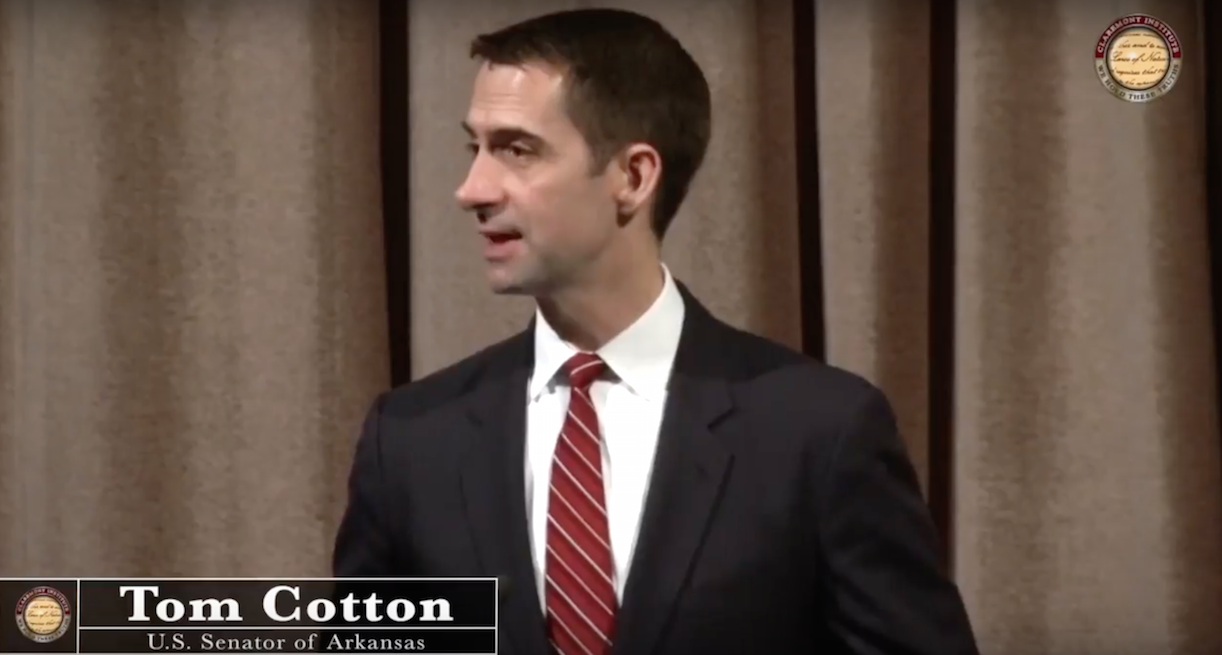America’s superior power is not a moral entitlement.
Which America First?

With values and interests in tension, exceptionalism points in more than one direction.
Senator Tom Cotton’s address at the Claremont Institute offers real insight into the relationship between citizenship and immigration. But it is a major missed opportunity. There is a legitimate criticism to be made of so-called “cosmopolitan elites”—though the lazy reliance on such a cliché is itself a warning sign—but this is not it. Cotton’s remarks highlight a worthwhile delineation between citizens and non-citizens and its foreign policy implications. He does so, however, mostly by straw-manning liberals and anchoring his argument in an out-of-context reference to Barack Obama’s self-description as “a citizen of the world.” The full quote, during a 2008 speech to an audience in Berlin, reads: “I speak to you not as a candidate for President, but as a citizen—a proud citizen of the United States, and a fellow citizen of the world.”
Cotton argues that “they”—cosmopolitan elites like Obama—“believe that American citizenship…is meaningless, ought not to be foreclosed to anyone, and ought not be the basis for distinctions between citizens and foreigners.” In reality, few presidents were as careful, in practice if not necessarily in theory, to make such a distinction as Obama was. It animated his foreign policy, particularly in Syria and the broader Middle East, where he was loath to involve himself in “somebody else’s civil war,” as he once dismissively put it. For Obama, the priority would remain on America and Americans, even if it meant abdicating the very “moral leadership” Cotton lauds in his speech.
These faults aside, Cotton’s attempt to flesh out intellectually what has remained for Trump purely instinctual is perceptive in its own way. In a previous piece, I wrote about Trump’s “attempt to put forward a set of markers and guidelines for those who wish to carry the ‘America First’ mantle into the future.” Here, Cotton says that America is indeed “an idea—but it is not only an idea. America is a real, particular place with real borders and real, flesh-and-blood people.” (Part of the problem, which Cotton never addresses, is that these flesh-and-blood people no longer agree on what exactly the idea of America is).
Yet the practical implications of this nationalist pose are unclear, at least in the foreign policy realm. Cotton seems to be arguing that Obama-style universalism and “arc of history”-ism led him to project rationality and good intentions onto dictators, who turned out to have little interest in meeting our outstretched hands halfway. This is a fair critique of some liberal internationalists—and certainly President Obama—but it is not obvious that the impulse to indulge autocrats is more likely found under Obama’s universalism than under Trump’s nationalism. While Obama did indulge Saudi Crown Prince Mohamed bin Salman, to cite one telling example, Trump has clearly indulged him more, even as it became increasingly clear that bin Salman’s recklessness was undermining America’s interests in the region.
Cotton gets us no closer to synchronizing our ideals and our interests (itself a problematic binary because it suggests the two are necessarily in tension). He notes that “commerce and other peaceful pursuits dominate our lives. There’s a natural tendency among democratic peoples therefore to believe that these principles apply in international relations as well. But they don’t.”
It’s true that they don’t, necessarily. Regime type matters. Dictatorships behave in fundamentally different ways than democracies, and particularly liberal democracies, in part because authoritarian leaders’ incentive structures are different. But this very realization means that democracies have a vested interest in promoting democracy where it doesn’t yet exist, even if the targets of that promotion are our allies, as they tend to be in the Middle East.
We are in fact different, but this difference could just as conceivably lead us to the near opposite of where Trump’s “America First” (or “Americans first”) has led us thus far. Unless it can be used as a cudgel against adversaries, President Trump has displayed little interest in other countries’ internal conduct. As Trump argued in his United Nations address:
“I honor the right of every nation in this room to pursue its own customs, beliefs, and traditions. The United States will not tell you how to live or work or worship.”
But a deeper understanding of American exceptionalism—which has quite a lot to do, as Cotton acknowledges, with our particular constitution and democracy—is in tension with the cultural relativism that Trump has often hinted towards and which, I would argue, is the inevitable if not necessarily intended result of an “America first” foreign policy.
It would have been an important contribution if Cotton could have attempted to resolve these tensions at the heart of a new populist-nationalist project. For those of us who see such a project as a danger to both American values and American interests, it would be helpful to know what exactly we’re arguing against and to argue against a better, smarter version of it. So far, however, this alternative foreign policy remains more of an instinct and a posture more than the intellectual position Cotton clearly wants it to be.
The American Mind presents a range of perspectives. Views are writers’ own and do not necessarily represent those of The Claremont Institute.
The American Mind is a publication of the Claremont Institute, a non-profit 501(c)(3) organization, dedicated to restoring the principles of the American Founding to their rightful, preeminent authority in our national life. Interested in supporting our work? Gifts to the Claremont Institute are tax-deductible.
Radical self-definition destroys the self and the nation.
The elite imagination is no longer the happiest place on Earth.
Protecting our regime demands more attention to reality than to realism.
Can America recover a nationalist vision of world leadership?





